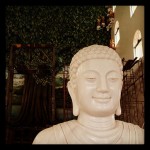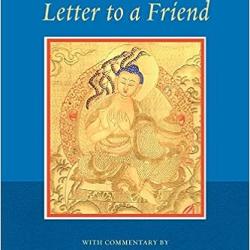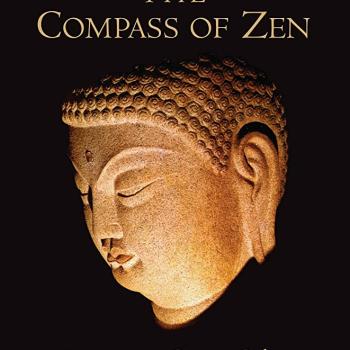29. If you know that thoughts are illusions then you’re already free. What need is there for practice? Free of delusion, you’re already Enlightened.
We have innate wakefulness, we are said to be Enlightened already. Our discursive thoughts are sometimes described as flowers in the sky, in other words, imaginary. So Sahn is telling us that we become Enlightened by realizing we are Enlightened already.
30. Beings can dwell in complete stillness, with nothing moving, no coming and no going. This is sometimes called “birthless”. But they can still have the delusion of life and death, and still believe that these things are real, like seeing flowers appear in the sky.
We can still our minds and have great successes in our meditation practice and still not see things as they are. We can expand our awareness a great deal without stopping our minds from putting things in categories all the time. Dualistic thinking is a powerful delusion and can be difficult to cut through.
31. We may say, “Bodhisattvas save beings by leading them to Enlightenment.” But really there are no beings who attain Enlightenment.
This is a tough one to grasp. It’s the message of the Heart Sutra, “No attainment and nothing to attain.”
If we all have the same true nature at the center of our being, if there is a oneness to things, then who is there to save? And who is it that does the saving? We are one. If I save you, you also save me. We get there by realizing we’re already there. And we save others by realizing there are no others to say.
“We aren’t lonely-not because there are others there, because there are none.” -Ram Dass.
32. We can have sudden Enlightenment experiences, but our delusions can’t be eliminated quite so fast.
There is one way of thinking that says that we suddenly experience Enlightenment all at once, like a flash of lightning. In that view we have a big experience that changes our relationship to the world around us completely. There’s another way of thinking that says that we gradually become Enlightened, clearing away a little delusion at a time, like polishing a mirror. There has been considerable debate within Buddhism regarding which view is more accurate. So Sahn is saying that both can be true. In his view we have these big experiences, these flashes of insight and they are life-changing, but we also gradually cultivate our minds. We clear away our delusions bit by bit until we see things more clearly.
33. Practicing is pointless if we don’t follow the precepts.
I went over the precepts in an earlier section of this text, but I’ll go over them again. These are the five precepts that represent the basis for Buddhist ethics.
The First Precept: I vow to support all living creatures, and refrain from killing.
The Second Precept: I vow to respect the property of others, and refrain from stealing.
The Third Precept: I vow to regard all beings with respect and dignity, and refrain from objectifying others.
The Fourth Precept: I vow to be truthful, and refrain from lying.
The Fifth Precept: I vow to maintain a clear mind and refrain from harming myself or others with intoxication.
34. People who lack virtue don’t follow precepts. So they generate negative karma. Such people lead a lazy life, looking down on others and starting fights.
It’s easy to talk about cultivating awareness and mindfulness and to forget that there’s an ethical dimension to Buddhism. Buddhism is sometimes described in terms of the three trainings: training in morality, concentration, and wisdom. These three are considered equally important.
35. Wisdom and clarity arise from meditation practice.
The power of meditation can do so much for us. We follow the ethical system detailed above because our meditation is more powerful when we aren’t distracted by things like lust and anger.
36. When the mind is in deep meditation, one clearly sees the way things arise and vanish.
We can see everything around us more clearly if we expand our awareness. We can really come to a direct understanding of the impermanence and emptiness of things.
37. If we can encounter different situations without judgment, this is what’s called “the unborn”. This is our nature before thinking. Before thinking there is Enlightenment.
This reminds me of that famous question. “Who were you before the world told you who to be?”
What was the world before you started putting labels and judgments on everything? To see things as they really are, before we put our own labels on them, is Enlightenment.
38. Some might have the idea that we practice in order to attain Enlightenment. This is a mistake. Our minds are originally clear and free, just as they are. Just realizing this is our Enlightenment. That is why it is taught, “All things are originally marked by Enlightenment.”
This is the teaching of Buddha nature. We have innate wakefulness. We are already Enlightened and free. Our true nature is one with everything and we just have to penetrate our delusion to see this. We have Basic Goodness and we are awake and free.
39. If a poor man comes to ask for help, give him what he needs if you can. Have great love and compassion, thinking of him as yourself. This is true generosity.
Generosity is one of the six perfections.
The Perfection of Generosity is about more than simply giving things. It’s an expression of non-attachment to possessions, but it also represents other forms of giving, such as giving our time to others, helping them with difficult tasks, or just listening when someone needs to be heard.
40. Though someone might injure you in some way, keep a calm mind. Don’t give in to anger. When a single angry thought appears, many obstacles appear.
Anger is one of the three poisons. When we let it come into our minds, it only brings us more suffering. I think we can all think of examples where giving into anger made a situation worse.
41. If you don’t have patience, Enlightenment can’t be attained.
Patience is another one of the six perfections of the Bodhisattva path.
The Perfection of Patience represents not only patience with ourselves and others, but also tolerance and endurance. It represents our ability to “weather the storm”, to bear hardship without letting it get us down and, especially, to avoid lashing out at others because of our personal difficulties.
42. Just dwelling in the original true mind is the supreme practice.
Don’t think about how great your practice will be when you’re Enlightened. Practice is Enlightenment. There is no separation.
———————————————————————-
![]()
Daniel Scharpenburg is a meditation instructor and dharma teacher in Kansas City. He regularly gives teachings through the Open Heart Project, the largest virtual mindfulness community in the world.
Find out more about Daniel on his website and connect with him on Facebook.
———————————————–
UPCOMING EVENTS
10/24/17:
Dharma Talk: Confidence in Mind, Daily Dharma Gathering, online 7-7:30pm













